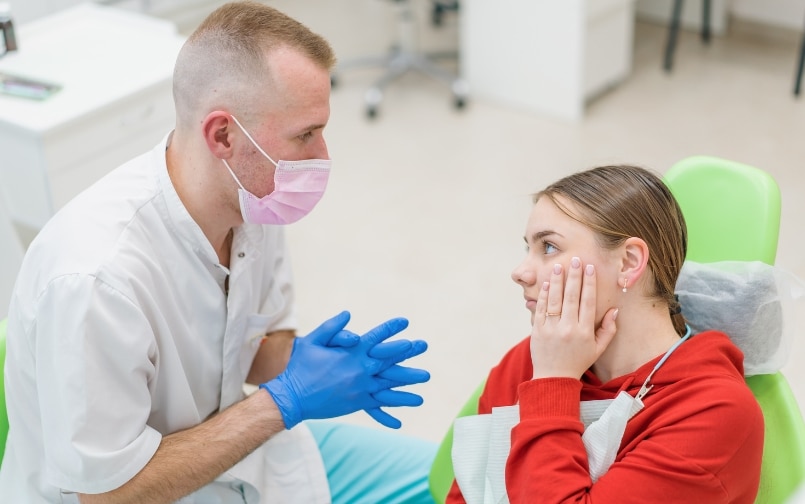When Do You Need Emergency Dental Care?

Dental emergencies can happen without warning, causing severe pain and discomfort. Knowing when to seek emergency dental care can make a significant difference in preventing further damage and ensuring optimal oral health. Immediate attention can save a tooth, prevent infections, and alleviate intense pain.
In this blog, we’ll explore common dental emergencies, their symptoms, and the steps you should take when faced with an urgent dental issue.
Many people often hesitate or feel unsure about what qualifies as a dental emergency. This hesitation can lead to delayed treatments, worsening conditions, and more complicated procedures later on. By understanding the signs that necessitate emergency dental care, you can act promptly and effectively, seeking treatment from a qualified emergency dentist near you.
We’ll cover various scenarios, from severe toothaches to knocked-out teeth and provide clear guidelines on what actions to take. Your quick response can significantly impact your dental health outcomes and overall well-being.
Recognizing Dental Emergencies
Understanding what constitutes a dental emergency is crucial for taking timely action. Be it first aid during dental emergencies or visiting an emergency dentist near you, recognizing a dental emergency is the very first step of the process.
- Severe Toothache: A persistent, severe toothache that doesn’t improve with over-the-counter pain relief requires urgent dental care. This pain often indicates an infection or deep decay.
- Knocked-Out Tooth: If you knock out a tooth, immediate action can save it. Try to place the tooth back in the socket or keep it moist with milk or saliva and seek dental care immediately.
- Broken or Cracked Tooth: A broken or cracked tooth can expose nerves and cause intense pain. Immediate dental care can prevent further damage and alleviate discomfort.
Symptoms Requiring Immediate Dental Attention
Certain symptoms indicate the need for emergency dental care. Along with first aid, you must quickly prepare to visit an emergency dentist in Nederland, TX, as soon as you notice these signs:
- Swelling and Infection: Swelling around the gums, face, or neck can signify an infection. Dental infections can spread rapidly and become life-threatening if not treated promptly.
- Bleeding: Uncontrolled bleeding from the mouth or gums after an injury or dental procedure requires urgent attention. This could indicate damage to blood vessels or tissues.
- Loose Teeth: Adult teeth should never feel loose. A loose tooth could indicate advanced gum disease, injury, or other severe dental issues that need immediate evaluation.
Common Dental Emergencies
Several dental issues frequently require emergency dental care.
- Abscessed Tooth: An abscessed tooth is a severe infection at the tooth root or between the gum and a tooth. Symptoms include fever, swelling, and a pus-filled bump on the gums. Immediate treatment is crucial to prevent the infection from spreading.
- Lost Filling or Crown: Losing a filling or crown leaves your tooth vulnerable to damage and infection. Emergency care can replace the lost filling or crown and protect the exposed tooth.
First Aid for Dental Emergencies
Taking the right steps before reaching an emergency dentist can make a significant difference.
- Toothache Relief: Rinse your mouth with warm water and gently floss to remove food particles. Avoid placing aspirin directly on the tooth or gums, as it can cause tissue damage.
- Handling a Knocked-Out Tooth: Handle the tooth by the crown, not the root. Rinse it gently without scrubbing. Try to place it back in the socket or keep it moist (cup of milk) until you reach the dentist.
- Managing a Broken Tooth: Rinse your mouth with warm water to clean the area. Apply a cold compress to reduce swelling, and make an appointment immediately.
Preventing Dental Emergencies
Prevention is always better than cure. Here’s how you can avoid dental emergencies.
- Regular Dental Check-Ups Regular visits to the dentist can catch potential issues before they become emergencies. Professional cleanings and exams are essential for maintaining oral health.
- Protective Gear: Wear a mouthguard during sports and recreational activities to prevent injuries. Use a night guard if you grind your teeth at night.
- Good Oral Hygiene: Brush and floss daily to prevent decay and gum disease. A healthy mouth is less likely to experience emergencies.
When To Visit An Emergency Dentist Near You?
Some dental emergencies require immediate medical attention beyond dental care.
- Severe Swelling: If swelling affects your ability to breathe or swallow, go to the emergency room. This could indicate a severe infection requiring immediate medical intervention.
- Traumatic Injuries: If a dental injury results from trauma, such as a car accident, seek emergency medical care. You might need treatment for other injuries alongside emergency dental care.
Recognizing the signs of a dental emergency and knowing how to respond can protect your oral health and prevent complications. Severe pain, swelling, or injury to your teeth or gums should never be ignored. By acting quickly and seeking professional dental care from an emergency dentist near you in Nederland, TX, you can alleviate pain, prevent further damage, and ensure the best possible outcome for your dental health.
Nederland Family Dental is a trusted name for prompt and effective emergency dental care. With a proficient dental team and a renowned emergency dentist, Dr. Gomez, we offer swift and efficient dental care services tailored to your needs.





